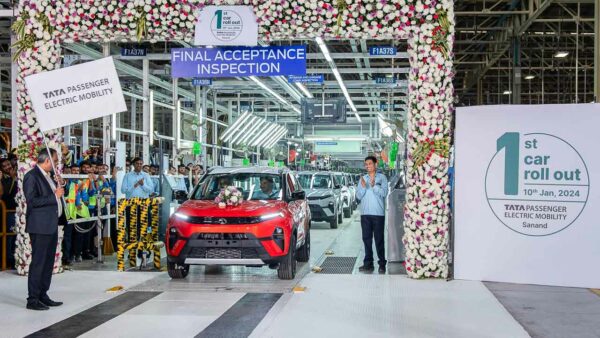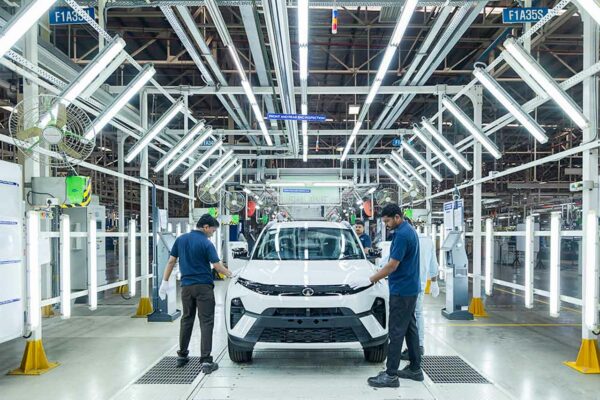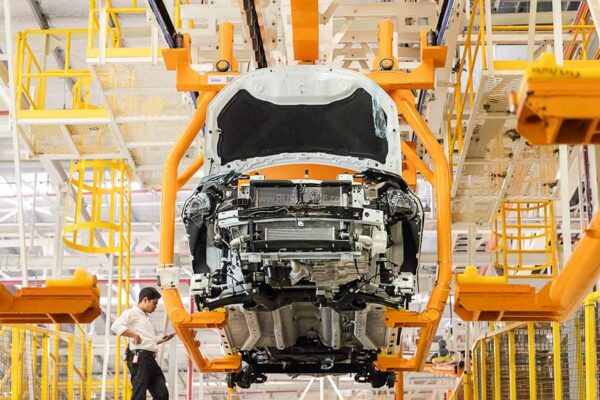
Tata Motors Commences Production at State-of-the-Art Electric Vehicle Facility in Sanand, Gujarat
In a significant development for the Indian automotive industry, Tata Motors’ subsidiary, Tata Passenger Electric Mobility Ltd. (TPEM), has officially begun production at its newly acquired facility in Sanand, Gujarat. The state-of-the-art plant, formerly belonging to Ford India, witnessed the historic rollout of the first Tata-branded car, their best-selling Nexon SUV.
Rapid Transformation: Retooling the Sanand Facility in Record Time
The acquisition of the plant, completed in January 2023 for approximately Rs 750 crores, marked Tata Motors’ strategic move to expand its manufacturing capabilities in response to the growing demand for electric vehicles (EVs) in the country. The Sanand facility, spanning an impressive 460 acres, is now Tata Motors’ second plant in Gujarat dedicated to manufacturing both Internal Combustion Engine (ICE) and EV models.

Shailesh Chandra, Managing Director of Tata Motors Passenger Vehicles Limited & Tata Passenger Electric Mobility Limited, expressed his pride in witnessing the inaugural car roll out from the new facility. He credited the accomplishment to the efficient retooling of the factory within a remarkable 12-month timeframe. Chandra extended his gratitude to the Government of Gujarat for their support and acknowledged the pivotal role the employees played in achieving this milestone.
Chandra emphasized the importance of the new facility in Tata Motors’ growth strategy, stating, “With existing capacities near saturation, this new facility will unlock an additional state-of-the-art manufacturing capacity of 300,000 units per annum, scalable to 420,000 units per annum.” He highlighted Tata Motors’ commitment to sustaining momentum with a robust pipeline of future-ready “New Forever” products and proactive investments in electric vehicles.

Growth Trajectory: Tata Motors’ Vision for the Sanand Facility
Situated in the industrial hub of GIDC Sanand, the plant benefits from a strong network of suppliers. The facility, equipped with cutting-edge technology and high automation levels across its four main shops—Stamping, Body Construction, Paint, and Final Assembly—sets a new benchmark within the industry.

The major retooling and technological upgrades include the press shop with new dies for stamping critical skin panels, the weld shop with modifications to all lines and additional robots, and the paint shop with enhanced handling systems and internal robotic painting setups. The assembly shop also underwent modifications in handling systems and end-of-line systems.
Currently employing over 1000 personnel, Tata Motors plans to create an additional 1000 jobs in the next 3 to 4 months, aligning with production ramp-up plans. The company has invested in upskilling its workforce by providing diploma, bachelor’s, and master’s degree programs. Additionally, the plant reflects Tata Motors’ commitment to sustainability, featuring a 50 KW solar rooftop installation and aiming to become water positive by December 2024.
The commencement of production at the Sanand facility reinforces Tata Motors’ position as a key player in the Indian automotive sector, particularly in the burgeoning electric vehicle market. The successful retooling and modernization of the plant underscore the company’s commitment to innovation, sustainability, and meeting the evolving needs of the Indian automotive landscape.






